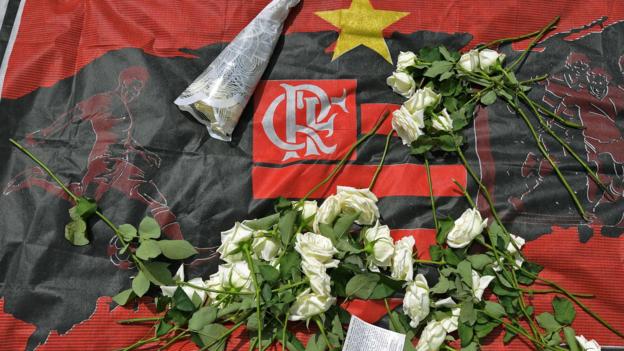
“Everyone is born a Flamengo fan, but some degenerate along the way.”
This local phrase does much to highlight the swagger and self-esteem of Brazil’s most popular club, a huge institution whose history does much to illustrate that of the game in this giant country.
Formed in 1898 as a rowing club, Flamengo took up football a few years later and were in their early years an institution for the elite.
But in the 1930s Brazilian culture was changing – previously persecuted, the samba musicians were suddenly becoming national heroes.
Flamengo sensed the changing times and carried out a clever re-branding. They signed the leading three black players of the day and presented themselves as the club of the people.
It was a masterstroke.
At the time Rio de Janeiro was Brazil’s capital. Radio carried Flamengo’s games to the far-flung corners of the land – where millions identified with the team.
To this day Flamengo can still fill stadiums thousands of miles from Rio. What happens at Flamengo resonates across the country, whether it is a big win, a frustrating elimination – or the heartbreaking tragedy of Friday morning, when fire took 10 young lives.
That working class and black support base saw the club labelled as the ‘urubu’ – the vulture. It was meant as a racial slur. But in the manner of these things, it was adopted as a motive of pride. Flamengo’s training ground, where Friday’s tragedy took place, is the ‘Ninho do Urubu’ – the vulture’s nest.
Legendary Brazil playmaker Zico spent the majority of his career at Flamengo, making over 200 appearances in two spells
Part of the tradition of the club is its youth development work. “We produce our stars at home,” is another famous Flamengo phrase. Pride of place goes to Zico, the club’s supreme idol, and the generation of home-grown talent that he spearheaded in the 1970s and 1980s.
In 1981 his team beat Liverpool 3-0 in Japan in the annual meeting of the champions of Europe and South America – a date that barely registers for Liverpool fans, but is considered the most glorious moment of Flamengo’s history. They have spent almost 40 years trying to repeat it.
Frequently they have been blown off course by financial chaos. In the early 1990s they were in such a mess that they let a young striker who supported the club slip through their fingers – the great, original Ronaldo.
But in recent times they have given priority to sorting out their affairs and giving themselves a platform for long-term success. Part of that process is the investment in the Ninho do Urubu training centre, where the first team can prepare and the stars of the future can be developed.
Two of their recent graduates have recently made it to big European clubs. Attacking midfielder Lucas Paqueta is settling in well at AC Milan, and teenage winger Vinicius Junior is already making a huge impact at Real Madrid.
Flamengo tweeted they were “in mourning” following the blaze
Paqueta and Vinicius came through the ranks at Flamengo.
They know the scene of the tragedy, and probably knew some of those who have lost their lives.
Paqueta, for example, will never forget the bridge situated close to the dormitory. When he was a youngster his mother used to take him as far as that bridge. “I’ve brought you up to here,” she used to tell him. “The rest is up to you.”
But cruel destiny can also have its say.
There are no guarantees that those who died on Friday would have gone on to become stars of the game. The odds are against. Many fall by the wayside.
But 15-year-old goalkeeper Christian Esmerio was clearly on the right track. He had already been called up to represent Brazil at under-17 level, and was being watched by European scouts.
He was entitled to have a head full of dreams when it hit the pillow on Thursday night.
Be the first to comment